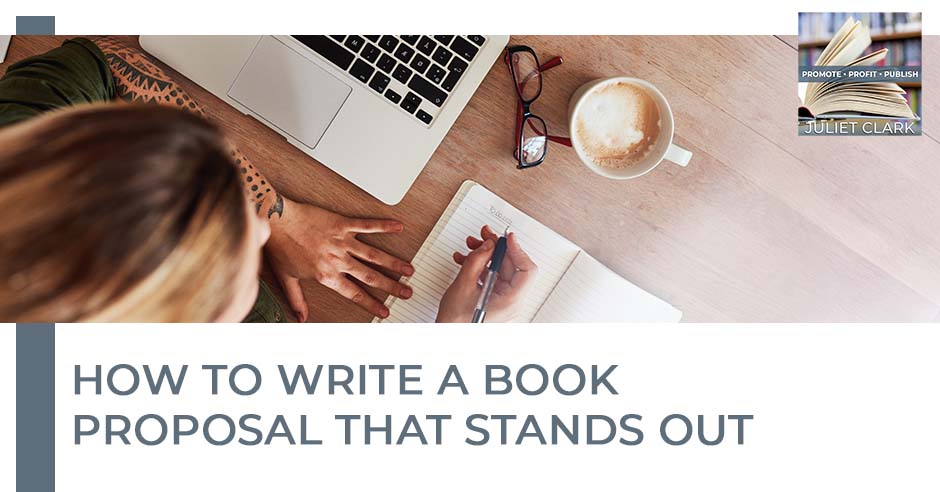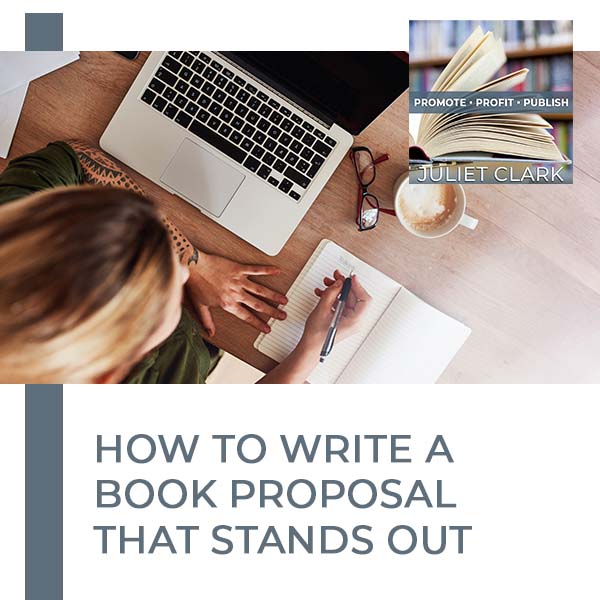
Do you know that no agent will represent your book without a proposal? Writing a well-thought-out book proposal shows you’re a credible investment. Juliet Clark sits with Joan Michelson, a Journalist, Coach, and host of the acclaimed Electric Ladies Podcast, to help you create one. Joan explains its six integral sections: overview, author’s bio, marketing plan, competitive analysis, chapter summaries, and sample chapters. She breaks down each of them and highlights the important guiding question you need to consider. Don’t miss out on this episode if you want to discover more strategies to stand out.
—
Watch the episode here
Listen to the podcast here
How To Write A Book Proposal That Stands Out With Joan Michelson
We have another fabulous guest. For those of you who are looking for proposal writing and perhaps getting that traditional contract, this is going to be a really great episode for you. We’re going to talk to somebody who does this regularly and knows all about it. Before we get started, don’t forget to go over and grab your free subscription of Breakthrough Author Magazine. Get some tips and tricks about the media world, press releases, editing, publishing, video trailers, whatever it is for you need help understanding what exactly it is you need to make your launch successful.
Go over there and get your free subscription. It’s a monthly magazine. You’ll get your first issue right away. www.BreakthroughAuthorMagazine.com. Also, don’t forget to go over and follow us over on YouTube, Superbrand Publishing. If you’re a podcast listener or maybe you prefer to be a video consumer, you can see all the videos of our interviews over there.
Our guest is Joan Michelson. She’s an MBA journalist, coach, and host of the acclaimed podcast, Electric Ladies, where she interviews remarkable women leaders and innovators in energy, climate, and sustainability across all industries, and shares career advice. She writes for Forbes and other media and helps authors write a book that communicates their message and helps their career and business goals. She previously spent many years as a leader with Fortune 100 companies, including Chrysler, American Express, Deloitte. She’s also mentioned that she has an MBA. You can find her podcast at www.ElectricLadiesPodcast.com.
—
Joan, welcome to the show. I’m excited to have you here because there’s so much confusion in the marketplace about, “Do I need a proposal? Do I not? Do I need to write the book first?” I’m excited to talk to someone who writes proposals as part of what you do.
I am jazzed to be here. It’s a really critical conversation that most people don’t have. In this world, many people are self-publishing that they go, “I’m going to write a book and that’s it.” No. You need to have it professionally edited. You need to think about who your reader is. There are a whole lot of steps in there. It’s not just, “I need a book.” Why? You need it to do what? I’m happy to talk about it.
That’s okay. You make some really good points here. We have so many writers’ workshops out there that are like, “Write this and it’ll be your business card.” That’s not the purpose of any book. I can’t even imagine. I know you’ve worked for a lot of large companies, and so have I. Going in and interviewing and saying, “I wrote the book on this.” How arrogant, yet that’s what so many people are saying like, “That’s what you need to do.” This is exciting.
It can be a form of credibility, but A) It’s not enough, and B) It’s more of the other way. When people come to me and say, “I want to write a book. My so-and-so says I need a book. I see all these other people with a book. I need a book.” Why? What do you have to say? I work with my clients about the intersection between the message that they feel compelled to get across with the skill, the expertise, and the depth of knowledge that they have uniquely with where the market is.
Show you’re a credible investment by knowing what you’re talking about. Share on XIf we could do a little Venn diagram, it would be right that sweet spot in the middle. It’s not just what you know. It’s what does that mean for the reader? What value is it going to provide for the reader? Who is the reader? What are they going to do with this book? What are they going to get out of it? Why would they buy it? Why would they look at it? Why would they read it?
To answer your fundamental question of why we need a book proposal, there are several reasons. One is, practically speaking, no agent will represent your book without a book proposal. If you send them a short overview, they’ll ask you for the book proposal. If you don’t have one, then you have to go off and write one, which is quite a task. It’s not just a paragraph that you toss out the door. Any publisher makes a decision whether or not to buy a book off a proposal.
It has to be well-written because it has got to pass through various gates of people. You know this from your experience too, but you have to get it through the sponsoring editor at the publisher, and then they take it to a table. It’s like if you’ve ever sold or tried to sell consulting or a product to a big company. You’re not just making a pitch to the person that you talk to, then that person has to pitch it internally, and you’re not in the room for those conversations.
In this context, just as your pitch deck is what is selling you to those other people for your big contract, your book proposal is what’s selling your book and you to the publisher. You’re best off even coming to an agent with at least a draft of a proposal. They will always edit it. If you’re attached to what you wrote, get over it because they’re always going to edit it.
If someone was to write their own proposal, what kinds of things are the people reviewing this looking for? What has to be on there that’s non-negotiable?
There are six sections. I’ll integrate those real quick and then tell you what each part is. There’s an overview, author’s bio, marketing plan, competitive analysis, chapter summaries, and sample chapters. The overview is shorter. It’s almost like the executive summary of a business proposal. It’s about a page, a page and a half, or two pages max, but it’s succinctly stating what your book is going to be about. You want to grab them at the beginning with a sense of why it’s unique. You can’t say, “It’s the only book on X,” because it’s not. You and I both know this. There are a million books published a year. Whatever you’re writing about, other people have written about. Accept it.
You put in a little bit about yourself and what makes you unique. The overview is in essence a small version of the rest of your proposal or an abbreviated version of the rest of your proposal. It’s an overview of what the book is about, why it’s going to sell, who you are, and who the reader is. The who you are part also has to include how you’re going to help them market it. Especially in this world, what platform do you have?

Book Proposal: No agent will represent your book without a book proposal.
The next section is an author’s bio, which is telling the agent and ultimately the publisher why you are a good investment for them, because you have a platform you’re going to work your butt off to sell the book, you’re doing speaking gigs, and you’re doing this and that. You’re going to have events buy your book when they hire you to speak.
You have been working in this space for 25 years or whatever the reason is that gives you this expertise. You’ve written X, Y, and Z on it. You could do a book on advertising because of the experience at Chiat/Day. You have to give the wow factor. This is an award that you’ve won, and it doesn’t matter when. The fact is you have to show them around the subject matter of your book and what it is you bring to the table.
I’m writing a book on women’s careers, so I’m talking about how I’ve been writing about women’s careers and I’m a career coach, and I have my Electric Ladies Podcast and speaking on these issues. That demonstrates, “This person knows what they’re talking about,” so you’re a credible investment. It’s not quite vetting for a big government job, but it’s that kind of a thing.
They’re going to check you out, so don’t lie. If you say you have 1 million followers on Twitter, they are going to go to your Twitter account, and if you don’t have 1 million followers, they will say, “Next,” throw it in the garbage, and you will never deal with those people again, anybody at the table, and anybody who’s read it. Don’t do it.
If you say you have a degree from somewhere, they will find out if you did. The next section is, to me, the most important. It’s the marketing section. That’s important even if you’re not going to use a traditional agent or publisher. You’re a hybrid publisher. If somebody comes to you with a book proposal and they have in it a marketing strategy, you’re in heaven, because you know how they’re going to help you market it and what they’re going to do. They’ve thought out who their reader is and why this particular reader is going to want this particular book.
If you write a book on female leaders, find female leaders to interview for the book, and then they will help. Share on XYou’re going to know they’re going to do all these speaking gigs. They’re going to sell books at their speaking gigs. You could get them on Amazon and Barnes & Noble. You will also find out how they’re going to help promote the book, the book events they’re going to do, and the ten associations that they’re involved in if they’re going to have interviews and they’re like, “I’m going to be speaking at the Women’s Automotive Network conference coming up in June. I could do books there. I do a fair amount of speaking engagements. I sell books there.” It makes the author not just say, “I need to write a book,” but come out and think about what they’re going to say, who they’re going to say it to, why that person cares, and how it’s going to get into the marketplace and grow.
Even hybrid publishers like you want to make money on the deal. You want to make sure that this book is going to be successful. In the book proposal, you also want to say what graphics you’re going to have, what images you’re going to include, and who you’re going to interview that’s going to help market it. One of the things that I do with my clients is I help them think about who the experts are in their field or who the other quotables are in their field or in the topic who would be great to either include interviews for the book from, have quotes from, or research from. Preferably, these are people who are still on the planet so they can help promote the book.
Someone did a book on my great-great aunt called The Superwoman. I wrote the foreword to the book. We did a ton of events. We did the museum, colleges, and women’s writings groups. We were all over the place until COVID shut us down. Everywhere we went, we sold books. I include in mine that I did that, and because I’m in the book, I’m helping to promote it.
Use the same strategy for people that are experts in your field or who have something to add. For example, if you’re doing a book on female leaders, find a bunch of female leaders to interview for the book, and then they will help. Even if they just post it on LinkedIn, Instagram, Facebook, or Twitter, and they go, “I loved being interviewed by Juliet for this book,” that’s golden.
You go to their gazillion followers. Anybody who picks it up there who wants to please them is going to promote it also, or their staff or their marketing department. That’s a critical piece, but to get back to the proposal, when you write the marketing section, you include all this and it helps the agent and the publisher understand that you know what’s involved, you will put your shoe leather to work, and you have the connections to make that happen.
Also, this is the validation of your audience, because you can say, “My reader is X, Y, Z,” but if you’re not connecting with those people in advance and have that following or that platform, then all of that marketing plan is a wish and a prayer.
That’s right. I’m glad you said that, because to that point, it’s important to include in your proposal statistics and studies. For example, I interviewed Bonnie Gwin, who is the Vice Chair of the ginormous global executive search firm, Heidrick & Struggles. She talked about a new study that they did that showed that in the first half of 2021, there was more turnover in the C-Suite than ever. The main reason we talked about was that it was because they had a new idea of the CEO they wanted. They wanted a different CEO. One of the interesting things that came out of their different CEO was they hired twice as many women into the C-Suite as ever.
It’s still a small number, but it’s twice as many. That’s great research. That’s the statistic you want to put in a proposal, like, “Seventy two percent of Millennials say they want to buy products that are sustainable and they’ll only look at those. Sixty two percent of consumers say they’ll pay more for a product that’s environmentally friendly.”
That’s what I’m saying. The agent and the publisher, and when I say the publishers, remember, it’s a whole group of people in a room that you don’t have access to. They can say, “This person knows their topic. They’ve done their research. They have their facts down. They know what they’re talking about,” and then they look at it.
It doesn’t mean you’re going to get the deal and it doesn’t tell you how big your advance is going to be if you go with a traditional publisher, but it will, at least, get you in the door and to the table. You build your credibility. You’re right. Those are credibility-building points. Your entire proposal is one giant description of your book and your credibility.

Book Proposal: Any book proposal has six integral sections: overview, author’s bio, marketing plan, competitive analysis, chapter summaries, and sample chapters.
The next part of this is you’re going to get into the sample chapters and the writing pieces. We’ve had a lot of discrepancies. We’ve got some writing coaches who are saying, “You have to write the whole book first,” which we’ve run into relevancy problems. By the time the books are written, the market’s saturated. We have others that said, “Write the proposal. Start writing the book, but understand you may have to self-publish.” Where are we really at with this?
By the way, a book proposal requires you to have sample chapters in it and an outline with a paragraph about each chapter. You have to have thought this out. You can’t just say, “I’m going to do a book proposal. If it sells, I’ll write the book.” Also, you have to do a competitive analysis. It’s not just anything on Amazon. I’ve had agents tell me they use an Amazon ranking for organizational purposes of 0 to 150,000. If you’ve got a book that’s ranked 8,742,000 on Amazon, do not include it in your proposal.
To answer your question, what I would do with clients is they come to me saying they want to write a book. Sometimes, they have written a manuscript, but it always gets a lot of work done. You start writing the book. First, we build it brick by brick. I’m like, “Tell me what you want to write about. Why do you want to write a book? Who’s going to buy this book? How do you know?” What do you bring to the table? We do an outline and chapters of what the book is about, and then we start building it out. I have them write a few paragraphs about it. I don’t do the writing. They do the writing, but I’m helping them do it.
I look at, by the way, how this book is going to help their business or career. If you want to speak about recycling, you want to do a book about recycling. That shows you know about recycling. If you want to do a book about buying couture clothing, that’s what you want to write your book about. For me, I do books that synchronize or support their career business. We start building and we do the outline. I’m like, “What topics do you want to include?” They have a few lines for each paragraph, and then start building out each of those small lines of copy for each section, and then we do a deep dive.
First, I like to have them write the introduction because the introduction is a short version of the whole book. They’d be like, “Why am I writing this? What’s the purpose? What inspired me to write this? Who is the right reader for this book? Why should they read this book? What are they going to find in the book?” Some introductions that you have in the first section, you’ll find this. In the second section, you’ll find that. In the third section, you’ll find that. Some, it doesn’t matter what sequence you write them in.
62% of consumers say they'll pay more for an environmentally friendly product. Share on XIf you’re like, “I’m doing a compilation of my career blogs into a book,” it’s going to be organized topics, but you can jump around. It doesn’t have to be a start to finish book. It’s not like a biography that you want to start at the beginning and go to the end. When we get to a certain point of the amount that they’ve written, we write an introduction, and then I have them start with the first chapter. Once we’ve gotten enough done and edited a certain amount, then we go back and start doing the proposal, because again, we’ve already talked about why do you want to write this and who is it for.
I pause them on the writing part, and then we build out the proposal, but you can’t build out the proposal until you know what you’re going to write. I call it the alchemy between the head and the fingertips. I’m a writer. I don’t always know exactly what’s going to come out until I touch the keyboard. That’s where the magic comes in, and then it’s an editing process, an accumulation, a pushing and pulling, and a dance, as I’m sure you do as well with your clients.
Many people try to do this on their own. There’s so much that you said that requires a professional. Let’s take the thing that popped out at me first. You’re taking it and breaking it down into what would pique the reader’s interest. There are very few of us who can copyright, and what you’re doing in this proposal is somewhat copywriting. It has to be exciting and relevant. It has to be all of those things. Most people cannot copyright. We all downplay ourselves a little bit. Talk a little bit about why you need a professional for this because I strongly believe you do.
First of all, I find women downplay themselves and men exaggerate. Especially for the bio, it’s excavating from your experience what’s relevant to this particular book. You might write, “I’m successful,” and you probably have a bio from your corporate life or you have your LinkedIn thing. A) It’s not about the book. That’s not specifically tied to the book. B) They’re mostly focused on what you’ve done recently. What we’re talking about is anything in your experience that is relevant to that book.
If you’re writing a book about how to design a business journal and you have a story that in high school, you started your yearbook, or in your small town, you started the town newspaper, that’s a relevant, sweet story to include in your bio. It pulls people in. They’re like, “It says this person is in love with this project. This person is attached to this project. This person is going to do anything that they need to do to make this successful because they’re into it.”
It’s not only that. You hit on something important with bios. It requires storytelling. You just don’t lay out your credentials, like, “I went to school here. I did this. I worked there.” That’s boring. You have to bring an element of storytelling into it.
You have to bring emotion into it. You have to evoke a response. The other reason you need it professionally written or professionally edited at least, is I get input from some of the agents that I’ve worked with sometimes. If you’re an expert in this field, chances are you’ve forgotten more than I’ll ever know about that field. You need somebody else to say, “Explain this more. That’s a word that’s not familiar to the normal public. You might use it every day in your office, but nobody else knows that word. How did you get there?. Explain this more. What statistics do you have?”
When you work with somebody else to help you write it, they’re asking you questions that will be uncomfortable and will push you. They are not there to tell you you’re wonderful and everything you write is brilliant. You want somebody who’s going to wrestle with you and say, “My goal is for this book to be successful. You’re telling a story, but I don’t even know what room they’re in.”
I have a wonderful client who I adore who tends to write very flowerily and metaphorically, but you can’t always tell what the heck’s going on because it’s a metaphor on top of a metaphor, and I’m like, “Are they in a car? Are they in a theater? Are they in an office? Where are they?” She answers and I’m like, “Say that.” I often tell people who think they can’t write, because everybody can write, in my view with varying degrees, is to talk into the voice memo on your phone and then have it transcribed. Post it to Temi.com, Get.Otter.ai, or one of those transcription sites and transcribe it. You can see it. That will help you get started in writing it because the best writing is how you talk.
People say to me, “How did you get into this business?” I’m in communications journalism, large marketing and advertising. I tell them I was born because my dad, when I was a kid growing up in New York City, he was one of the original madmen. He would pull a copy out of the typewriter, hand it to the closest warm body he could find, and there were over four kids in the family, and say, “Read this out loud to me.” Reading out loud is the best therapy if you don’t know how to write. That’s the other advantage to talking into your voice memo on your phone. You’re hearing yourself talk about it. Also, it’s easier to tell a story when you’re telling it than when you’re writing it.
I write copy for other people, but when I write my own copy, I’ll hand it off to my friend who’s a copywriter and she laughs. She’s like, “This is your best work?” She can pull so many of those things out of me and see that I tend to tone it down. If you read what I wrote about myself, it’s super boring. In fact, I’m going to address something you said earlier about you don’t always use your past.

Book Proposal: Your author bio requires storytelling; don’t just lay out your credentials.
When I was working with my second copywriter on my bio, he said to me, “What have you done in the past?” I had this bio that I’ve been using for about three years and I said, “I worked at Chiat/Day and Mattel.” He’s like, “I don’t see that anywhere. What account did you work on Chiat/Day? Isn’t that like a $1 billion a year account?” I’m like, “Yeah.” He’s like, “Why isn’t any of this in your bio?”
It was something that I took for granted. I didn’t think it would be interesting. I don’t think personally that you can write copy for yourself very effectively, but when I took my phone, recorded it, and sent it off to my copywriter, she wrote beautiful stuff out of the same thing that I thought sounded boring. It sounds like your dad had the right idea.
The other thing that happens is a lot of times when we think we’re writing, it’s different than when you’re talking something out. We tend to write really long, complicated sentences. I cannot tell you how many clients and even people that come to me with journalistic projects, I’m like, “I could map this sentence.” It’s better to keep it short.
It’s one of the things about reading it out loud. If you have to take a breath to even get to the end of the sentence, it’s too long. It’s a great measure. It’s human. We all have to breathe when we talk. In case I didn’t say this before, it’s worth repeating, they are required by literary agents and traditional publishers. A lot of hybrid publishers may not require them, but they love them. When I came to you with a client and I said, “We’re working on a book proposal,” you were like, “Yes.”
The reason is when we were just a self-publishing company, we didn’t get a lot, but with the hybrid, we get people who, for the most part, have worked. They have the proposal. They’ve worked with a writing coach. They’ve had their manuscript professionally edited already, but maybe they ran into, “The market was too saturated. I want this connected to my business and I don’t want to give up the rights to it.” We get quite a few books. We have in about the last couple of years, everybody has time during COVID, well-written books that used professionals and had proposals. It is exciting because now I can see what you think your competition is. I can agree or disagree with it and say, “What about this?”
That’s a good point because what happens is when you see what their marketing strategy is, you’re not starting from scratch to market the book. You’ve got what they’ve already outlined, and then you can build upon that and edit upon that. It triggers creative ideas in your mind. When the author is working with a coach or somebody like you, then we can ask them questions that then take it to the next level, because you don’t just want the basic level of marketing. In this world, you’ve got to be everywhere at once.
It's easier to tell a story when you're telling it than when you're writing it. Share on XI have a client who doesn’t even have children, but she has a husband and a dog. For the launch of her book, she left and went and stayed in another city so she could zero in and focus for the launch of the book. She tends to be a workaholic. She wanted to be out of her office without the other stuff that was around her too. It takes a lot of work.
I want to say to anybody who’s reading this that if you think writing a book is easy and you see all these courses and say, “I’m going to help you write a book in 90 days,” no. Not if you want it to be good, be a credible representation of your expertise, and be successful and meaningful in the world. By the way, a lot of the traditional reviewers will not review a book that is self-published.
That’s true.
They will review traditionally published books. Some of them may review books by hybrid publishers, and you and I can talk about that a little more if you want, but you will not get them to review a book that is 100% self-published. If you want those people to read your book, it has to be well-written, well-designed, have graphics and pictures, or what have you. It has to be well-laid out. It has to have a good cover and all of those things.
If you’re just going, “I’m going to write a book in 90 days,” you can do it, but have lower expectations of it and understand that it might not do well for your credibility in your field. If you’re only doing it for your grandkids, then that’s one thing. If you’re doing it for the marketplace to help you, to your point at the beginning of this, like, “I want to write a book because it’ll help me get speaking engagements,” what are you going to speak about? You need to have a book that’s well-presented because people are not going to want to sell your book if it looks like yuck.
That’s exactly true. This has been helpful. Thank you so much. If somebody wants to get ahold of you and possibly work with you, where can we find you?
I am all over the web. They can find me on Twitter @JoanMichelson. They can find me on my podcast, the Electric Ladies Podcast. They can find me on my website, ElectricLadiesPodcast.com. Also, on LinkedIn, Facebook, and Instagram, but the best place is to find me on my website or they can always contact you to be sent to me or on Twitter. I’m happy to chat with anybody.
Thank you so much. This was helpful.
I’m so glad. Thank you for what you do, by the way. It’s important.
Thanks.
Important Links
- Superbrand Publishing – YouTube
- www.ElectricLadiesPodcast.com
- The Superwoman
- Temi.com
- Get.Otter.ai
- @JoanMichelson – Twitter
- Electric Ladies Podcast
- LinkedIn – Joan Michelson
- Facebook – Joan Michelson
- Instagram – Joan Michelson
About Joan Michelson
 Joan Michelson, MBA is a journalist, coach and host of the acclaimed podcast Electric Ladies, where she interviews remarkable women leaders and innovators in energy, climate and sustainability across all industries, and shares career advice. She writes for Forbes and other media and helps authors write a book that communicates their message and helps their career or business goals. She previously spent many years as a leader with Fortune 100 companies, including Chrysler, American Express and Deloitte, and has an MBA.
Joan Michelson, MBA is a journalist, coach and host of the acclaimed podcast Electric Ladies, where she interviews remarkable women leaders and innovators in energy, climate and sustainability across all industries, and shares career advice. She writes for Forbes and other media and helps authors write a book that communicates their message and helps their career or business goals. She previously spent many years as a leader with Fortune 100 companies, including Chrysler, American Express and Deloitte, and has an MBA.









Leave A Comment